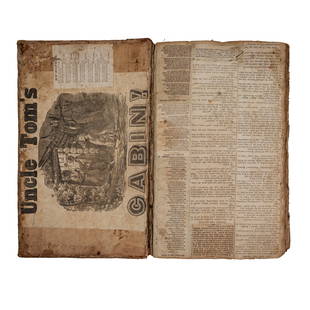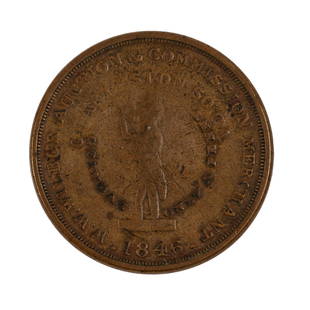
Seven Year's War Reimbursement for Use of a Horse
Similar Sale History
View More Items in Books, Magazines & PapersRelated Books, Magazines & Papers
More Items in Books, Magazines & Papers
View MoreRecommended Collectibles
View More





Item Details
Description
Colonial America
1758 Seven Year's War Reimbursement for Use of a Horse "... in the Late Expedition: in Defence of the Country ..."
January 9, 1758-Dated French & Indian / Seven Year's War Period, Manuscript Pay Order for Expenses Incurred, "...in the Late Expedition...", Very Fine.
This nicely written Document measures about 2-1/2" x 7-3/8" and directs the General Treasurer of the Colony of Rhode Island to pay 13 Pounds, 10 Shillings "...in mony old tenor..." to Mr. Joshua Eddy for: "...the hire of his horse in the Late Expedition: in Defence of the Country...". The only expeditions going on here would have been military sallies into Upstate New York and Canada to fight against and defeat the French and their Native American Indian allies. Signed by "John Smith" on the front, and by "Zebedee Hopkins" on the back, acknowledging payment of the requested amount.
In February 1757 Rhode Island ordered a five company
regiment of 450 men to assist Loudon in the ensuing
campaign. Samuel Angell was appointed "Chief Officer"
(i. e. Colonel) of this force which in May proceeded to
Albany. Meanwhile in March the French under Rigaud
attempted unsuccessfully to surprise Fort William Henry,
and Loudon prepared his futile expedition against Louisburg.
In May an act for raising 150 more men was passed by
the Rhode Island General Assembly at its May session, but
was repealed in August before the companies were raised.
Some of the Rhode Islanders under Angell were stationed
at Fort Edward, while others were at Fort William Henry.
Montcalm had not been idle during the spring, but had
collected a large force with the main part of which he sailed
up Lake George, while the balance of the force under De Levis
marched along the west shore of the Lake. Fort William
Henry was surrounded by the French but held out until
word was received from Gen. Webb, who was stationed at
Fort Edward, that he would not send assistance. Munro, the
commander of Fort William Henry was therefore obliged to
surrender on August 9th, 1757. A large number of the
English soldiers were massacred by the Indians on August
loth, although about 600 refugees succeeded in reaching Fort
Edward.
Col. Angell who was at Fort Edward wrote to Governor
Greene on August 14th and described the attack on Fort
William Henry in the following words :
"On the 3d inst., at five o'clock, in the morning, the fort
and camp were invested by Canadians and Indians ; and at
the same time, a large body of boats and canoes appeared on
the lake near, while our camp was attacked by a superior
number of the enemy. They landed their artillery the same
day. Our rangers brought in one of their lieutenants prisoner,
who gave account of their strength consisted of three thousand
regulars, five thousand Canadians, and three thousand five
hundred savages, thirty-six cannon, and four mortars.
"The siege continued obstinate till the ninth day at six
o'clock in the morning, when all the cannon, bigger than
twelve pounders, were broken ; the men in camp and garrison,
spent with fatigue. They capitulated on honorable terms, viz. :
that they should march to this place with a brass twelve
pounder in the front, and their fire-locks clubbed, and colors
flying, with all their baggage. This was agreed to, and
articles signed. General Montcalm and other principal officers
of his army, expressed and acknowledged that they had made
a defence beyond expectation, and for those reasons, he
allowed them as good terms as General Blakeney had. The
articles obliged our men not to bear arms till eighteen months
were expired.
"The morning following, our men were to march with a
strong guard of regulars, to keep the savages from insulting
them. When our people began to draw up for a march, the
horrible scene of massacre then began, by the savages scalping
our sick and wounded men ; next, by their drawing out all
the black men, scalping the Indians and keeping the negroes
for slaves. All this did not satisfy them; but they went to
stripping and scalping without distinction ; which put our men
to the flight, each man for himself " having no protection
agreeably to the articles. They all scattered in the woods ; the
Indians following them several miles. Our men have been
coming in since eleven o'clock, that day, till this morning, by
single persons and small parties; not a man but is stripped;
some, quite naked.
"There are yet behind several hundred; many of whom,
it is known, are sick, and many, it is thought, will perish in
the woods. This minute, a deserter from the French says
that above two hundred of our men went back to the French
for protection.
"By our parties just came in, we have certain accounts
that the fort is destroyed ; and that the enemy are drawing
off. We have about four thousand militia here, and two
thousand troops."
The danger by which Fort William Henry was threatened
greatly alarmed the Colony. The General Assembly met on
August loth, and not as yet having heard of the loss of Fort
William Henry, passed an act which drafted one sixth of the
militia of the colony, probably about looo men, for service in
the relief of Fort William Henry. Col. John Andrews was
given the command of this regiment. On August 15th thirty-
four prominent men of Providence who were not subject to
the draft volunteered their services and signed a paper of
that import. Of a muster roll of 113 men who marched out
of Newport County in answer to this call, 21 were volunteers.
This Second Rhode Island regiment went no farther than
Connecticut, when news was received that Fort William
Henry had fallen. The men returned home and the October
Assembly after regulating their pay for this service, voted to
re-enlist 250 men for service in the army during the pleasure
of the General Assembly.
Ninety of these did garrison service at Saratoga. Capt.
Ebenezer Whiting was given the command of those who were
garrisoned at Fort Edward during the winter.
If the campaign of 1756 had disheartened the English,
that of 1757 was still more discouraging. The expedition
against Louisburg had come to naught. Fort William Henry
had been lost, and from Europe came the still more
discouraging news that the Duke of Cumberland had been
decisively defeated by D'Estrees.
As well as sending the quota to the Colonial contingent,
Rhode Island had strengthened and garrisoned Fort George
at Newport, and had also equipped and sent forth many
privateers which had made severe and telling inroads upon the
enemy's maritime commerce.
1758 Seven Year's War Reimbursement for Use of a Horse "... in the Late Expedition: in Defence of the Country ..."
January 9, 1758-Dated French & Indian / Seven Year's War Period, Manuscript Pay Order for Expenses Incurred, "...in the Late Expedition...", Very Fine.
This nicely written Document measures about 2-1/2" x 7-3/8" and directs the General Treasurer of the Colony of Rhode Island to pay 13 Pounds, 10 Shillings "...in mony old tenor..." to Mr. Joshua Eddy for: "...the hire of his horse in the Late Expedition: in Defence of the Country...". The only expeditions going on here would have been military sallies into Upstate New York and Canada to fight against and defeat the French and their Native American Indian allies. Signed by "John Smith" on the front, and by "Zebedee Hopkins" on the back, acknowledging payment of the requested amount.
In February 1757 Rhode Island ordered a five company
regiment of 450 men to assist Loudon in the ensuing
campaign. Samuel Angell was appointed "Chief Officer"
(i. e. Colonel) of this force which in May proceeded to
Albany. Meanwhile in March the French under Rigaud
attempted unsuccessfully to surprise Fort William Henry,
and Loudon prepared his futile expedition against Louisburg.
In May an act for raising 150 more men was passed by
the Rhode Island General Assembly at its May session, but
was repealed in August before the companies were raised.
Some of the Rhode Islanders under Angell were stationed
at Fort Edward, while others were at Fort William Henry.
Montcalm had not been idle during the spring, but had
collected a large force with the main part of which he sailed
up Lake George, while the balance of the force under De Levis
marched along the west shore of the Lake. Fort William
Henry was surrounded by the French but held out until
word was received from Gen. Webb, who was stationed at
Fort Edward, that he would not send assistance. Munro, the
commander of Fort William Henry was therefore obliged to
surrender on August 9th, 1757. A large number of the
English soldiers were massacred by the Indians on August
loth, although about 600 refugees succeeded in reaching Fort
Edward.
Col. Angell who was at Fort Edward wrote to Governor
Greene on August 14th and described the attack on Fort
William Henry in the following words :
"On the 3d inst., at five o'clock, in the morning, the fort
and camp were invested by Canadians and Indians ; and at
the same time, a large body of boats and canoes appeared on
the lake near, while our camp was attacked by a superior
number of the enemy. They landed their artillery the same
day. Our rangers brought in one of their lieutenants prisoner,
who gave account of their strength consisted of three thousand
regulars, five thousand Canadians, and three thousand five
hundred savages, thirty-six cannon, and four mortars.
"The siege continued obstinate till the ninth day at six
o'clock in the morning, when all the cannon, bigger than
twelve pounders, were broken ; the men in camp and garrison,
spent with fatigue. They capitulated on honorable terms, viz. :
that they should march to this place with a brass twelve
pounder in the front, and their fire-locks clubbed, and colors
flying, with all their baggage. This was agreed to, and
articles signed. General Montcalm and other principal officers
of his army, expressed and acknowledged that they had made
a defence beyond expectation, and for those reasons, he
allowed them as good terms as General Blakeney had. The
articles obliged our men not to bear arms till eighteen months
were expired.
"The morning following, our men were to march with a
strong guard of regulars, to keep the savages from insulting
them. When our people began to draw up for a march, the
horrible scene of massacre then began, by the savages scalping
our sick and wounded men ; next, by their drawing out all
the black men, scalping the Indians and keeping the negroes
for slaves. All this did not satisfy them; but they went to
stripping and scalping without distinction ; which put our men
to the flight, each man for himself " having no protection
agreeably to the articles. They all scattered in the woods ; the
Indians following them several miles. Our men have been
coming in since eleven o'clock, that day, till this morning, by
single persons and small parties; not a man but is stripped;
some, quite naked.
"There are yet behind several hundred; many of whom,
it is known, are sick, and many, it is thought, will perish in
the woods. This minute, a deserter from the French says
that above two hundred of our men went back to the French
for protection.
"By our parties just came in, we have certain accounts
that the fort is destroyed ; and that the enemy are drawing
off. We have about four thousand militia here, and two
thousand troops."
The danger by which Fort William Henry was threatened
greatly alarmed the Colony. The General Assembly met on
August loth, and not as yet having heard of the loss of Fort
William Henry, passed an act which drafted one sixth of the
militia of the colony, probably about looo men, for service in
the relief of Fort William Henry. Col. John Andrews was
given the command of this regiment. On August 15th thirty-
four prominent men of Providence who were not subject to
the draft volunteered their services and signed a paper of
that import. Of a muster roll of 113 men who marched out
of Newport County in answer to this call, 21 were volunteers.
This Second Rhode Island regiment went no farther than
Connecticut, when news was received that Fort William
Henry had fallen. The men returned home and the October
Assembly after regulating their pay for this service, voted to
re-enlist 250 men for service in the army during the pleasure
of the General Assembly.
Ninety of these did garrison service at Saratoga. Capt.
Ebenezer Whiting was given the command of those who were
garrisoned at Fort Edward during the winter.
If the campaign of 1756 had disheartened the English,
that of 1757 was still more discouraging. The expedition
against Louisburg had come to naught. Fort William Henry
had been lost, and from Europe came the still more
discouraging news that the Duke of Cumberland had been
decisively defeated by D'Estrees.
As well as sending the quota to the Colonial contingent,
Rhode Island had strengthened and garrisoned Fort George
at Newport, and had also equipped and sent forth many
privateers which had made severe and telling inroads upon the
enemy's maritime commerce.
Buyer's Premium
- 30%
Seven Year's War Reimbursement for Use of a Horse
Estimate $400 - $500
Shipping & Pickup Options
Item located in Rancho Santa Fe, CA, usOffers In-House Shipping
Payment

Related Searches
TOP


















































































![George Washington Signed Discharge: Partly printed discharge document signed by George Washington, as Commander in Chief of the Armies of the United States. Newburgh, [New York], 4 January 1783. 1 page, ## x ## in. Undersigned by Washin](https://p1.liveauctioneers.com/7226/322253/173251475_1_x.jpg?height=310&quality=70&version=1710004847)


